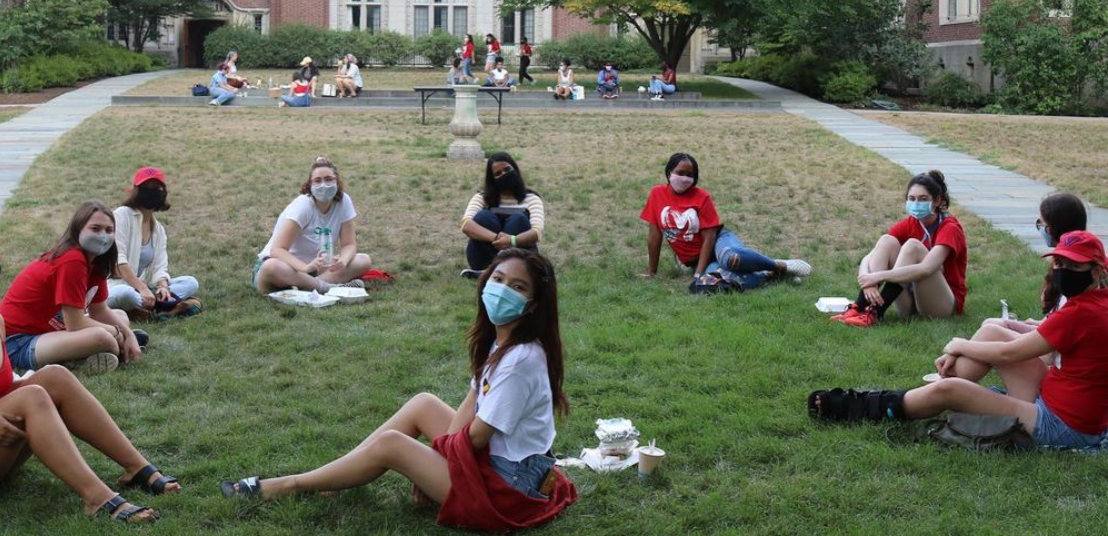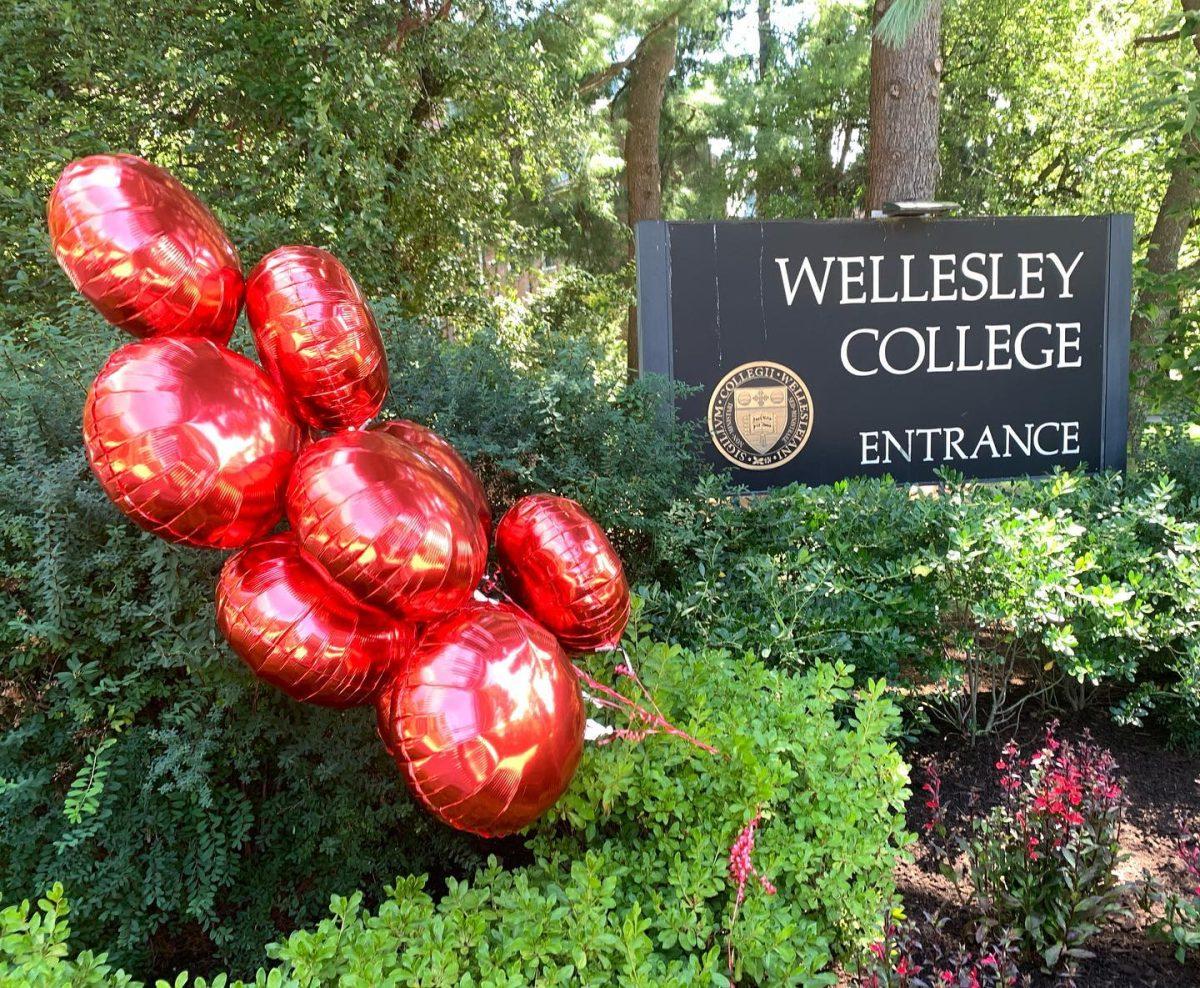“Is this gonna be how it is the entire time?”

Shelby Deibler ʼ24 chose Wellesley for the close community and strong relationships with professors the school promised. She pictured hanging out in her room with her door open and getting to know her new environment through a whole week of orientation. When Wellesley released its COVID-19 fall reopening plan, she looked forward to food truck festivals and movie nights, ideas floated by the Office of Residential Life during summer webinars. She registered for three in-person classes, which she expected to be more engaging than her one course online.
When Deibler arrived, however, dorm room doors mostly stayed closed, and food trucks were nowhere to be found. Movie nights did begin in October, but by then the evenings were cold.
Deibler matched with her blockmates on the StarRez housing portal, and they moved into the third floor of Stone-Davis. The block turned out to be more of a social institution than a merely residential one, and she found that due to the pandemic, dorm life was heavily restricted. For one thing, blockmates were not allowed in each other’s rooms until late October, and common spaces were less inviting with everyone masked and distanced. When rules changed and students were allowed one blockmate in their rooms, “it [still] felt like we were breaking a rule,” said Deibler. And her block of six could not find a dining hall table large enough for all of them.
“You had to be creative with how you were meeting other people,” Deibler said.
To socialize despite limited in-person events and restrictions on eating with others, Deibler reached out to some classmates and joined the novice crew team.
“I felt community more in the in-person, small gatherings, but due to the block rules and other regulations, it was difficult to meet new people and establish bonds as a group,” Deibler said.
Bryn Flanigan ʼ24 imagined even tighter COVID-19 restrictions when she arrived on campus, so she was happy to spend time hanging out with her block and bonding over frequent shared meals.
“I was expecting to spend a lot more time in my room,” she said.
She knew that she would have a relationship with her block, but she didn’t expect that her blockmates would become her closest friends, which they did.
“We ate almost every single meal together, except for breakfast,” Flanigan said of her blockmates. “We studied together and hung out on the weekends.”
Another First-year, Ashley**, began college remotely. She was assigned an Orientation Mentor like the rest of the First-years, but she was the only remote student in her group and felt like her OM “forgot they had a remote mentee.”
Social media connected Ashley with other First-years, who chatted and supported each other. For many, the first year of college is already a hard time to make friends; studying remotely, on top of that, made her feel disconnected from campus.
Programming got off to a slower start than Flanigan had imagined, but “things started to really improve by the end,” she said—there were more events, and the food got better. She didn’t mind the lack of events at the start of the semester, since she had fun exploring campus, finding new study spots, and hanging out with friends.
Remote classes turned out to work better for Deibler than in-person. She was excited to go back to the three-dimensional classroom, but found that “it kind of became a chore to go to them” since she was “not even going to get the full experience.” Group work was impossible with physical distancing requirements, and classes sometimes met over Zoom for discussions. Deibler appreciated the consistency of her remote course, but she found that it was “hard to have discussions” over Zoom.
Ashley chose Wellesley for its location outside Boston, and to study physics without having “to fight for opportunities and air time” in a male-dominated environment.
Study physics she did. Her first semester, she dove right into two physics courses and calculus. Having taken a gap year, Ashley was new to virtual school. It turned out to be more different from in-person learning than she had imagined.
“It’s so much more tiring than literally having five different commitments in a day, all day,” she said, contrasting her first semester of college with her high school experiences.
There is no mingling after class when you are meeting on Zoom. Being away from classmates made it challenging to find a partner for problem sets; when Ashley eventually did, the work went by much faster.
Flanigan took four in-person courses in the fall, which included classroom time and asynchronous instruction.
“It was really nice to be able to walk to a classroom, sit in it, and engage with people in-person,” Flanigan said.
Professors were surprisingly flexible and accommodating, said Deibler. However, she was disappointed by the lack of close relationships with faculty.
“The term system made it very difficult to form strong relationships with professors because we were only with them for less than seven weeks,” Deibler said.
Ashley also found the term system taxing. She remembered being stressed to the point of tears during calculus, a subject she loved. Weekly quizzes in one class were unproductive, but since she was new to college, new to a more traditional way of schooling, and new to remote learning, she did not know if she could advocate to change the assessment.
Next year, when Ashley hopes to be on campus, she will be adjusting to Wellesley for the first time. But she will not be treated like a First-year. And without knowing what life at Wellesley was like pre-pandemic, she does not know how her experience this semester will relate to that of future ones.
“Is this gonna be how it is the entire time?” Ashley said.
Flanigan is looking forward to a post-pandemic college experience, when she’ll be able to take the bus to Boston and socialize more. But she was pleasantly surprised with how much she connected with other students.
“The pandemic made me glad to have picked Wellesley,” said Flanigan. “I felt lucky that the profile of the school allowed us to adjust and come back.”
**=anonymous interviewee






